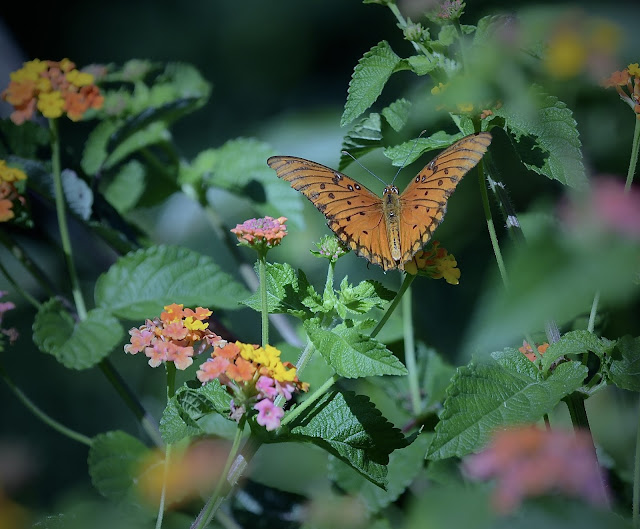Never say there is nothing beautiful
in the world anymore. There is always something
to make you wonder in the shape of a tree, the trembling of a leaf.
Albert Schweitzer
I took another walk this morning through the 300-acre South Carolina Botanical Garden, which, to my good fortune, is located less than half an hour from my house. As I had done in recent days, I took my camera and was primarily focused on capturing images of some of the butterflies that are abundant in this area this during July and August. As I finished taking photos of the butterflies and began returning to my car, I turned around and saw these wonderful green, oval leaves that were backlit by the sun. It was a truly magical moment, one of those luminous moments in which time seems to be literally suspended. After a few minutes of absorbing what I was seeing, I shot the header photo, which turned out to be my favorite image of the day.
Here are some of the other images I've taken in recent days — mostly butterflies and moths, but also a few flowers along the way. I've also added some insightful words from others who, like me, find nature to be a perennial source of beauty, contentment, and joy.
I only ask to be free.
The butterflies are free.
Mankind will surely not deny to Harold Skimpole
what it concedes to the butterflies.
Charles Dickens
Bleak House
Happiness is like a butterfly:
the more you chase it, the more it will elude you,
but if you turn your attention to other things,
it will come and sit softly on your shoulder.
Henry David Thoreau
It seems to me that the natural world
is the greatest source of excitement;
the greatest source of visual beauty;
the greatest source of intellectual interest.
It is the greatest source
of so much in life that makes life worth living.
David Attenborough
Deep in their roots,
all flowers keep the light.
Theodore Roethke
Butterflies are self propelled flowers.
R.H. Heinlein
My soul can find no staircase to Heaven
unless it be through Earth's loveliness.
Michelangelo
I embrace emerging experience.
I participate in discovery.
I am a butterfly.
I am not a butterfly collector.
I want the experience of the butterfly.
William Stafford
The temple bell stops
but I still hear the sound
coming out of the flowers.
Basho
I dreamed I was a butterfly,
flitting around in the sky;
then I awoke.
Now I wonder:
Am I a man who dreamt of being a butterfly,
or am I a butterfly dreaming that I am a man?
Chuang Tzu
When you take a flower in your hand
and really look at it, it's your world for the moment.
I want to give that world to someone else.
Most people in the city rush around so,
they have no time to look at a flower.
I want them to see it whether they want to or not.
Georgia O'Keefe
If we surrendered
to earth's intelligence
we would rise up rooted, like trees.
Rilke
to earth's intelligence
we would rise up rooted, like trees.
Rilke
It is written on the arched sky;
it looks out from every star.
It is the poetry of Nature;
it is that which uplifts the spirit within us.
John Ruskin
it looks out from every star.
It is the poetry of Nature;
it is that which uplifts the spirit within us.
John Ruskin
Nature is not a place to visit.
It is home.
Gary Snyder
I go to nature to be soothed,
and healed,
and to have my senses put in order.
John Burroughs
The butterfly counts not
months but moments,
and has time enough.
Rabindranath Tagore
Nature never deceives us;
it is we who deceive ourselves.
Jean-Jacque Rousseau
There is pleasure in the pathless woods,
There is rapture on the lonely shore,
There is society, where none intrudes,
By the deep sea, and music in its roar:
I love not Man the less, but Nature more.
Lord Byron



























































